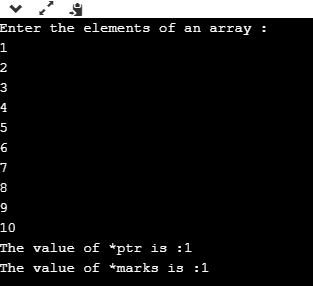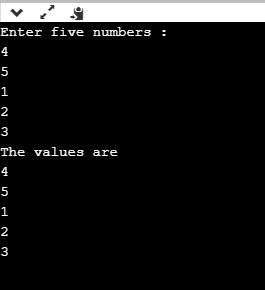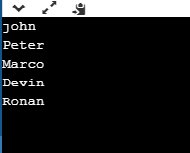C++ Array of PointersArray and pointers are closely related to each other. In C++, the name of an array is considered às a pointer, i.e., the name of an array contains the address of an element. C++ considers the array name as the address of the first element. For example, if we create an array, i.e., marks which hold the 20 values of integer type, then marks will contain the address of first element, i.e., marks[0]. Therefore, we can say that array name (marks) is a pointer which is holding the address of the first element of an array. Let's understand this scenario through an example. In the above code, we declare an integer pointer and an array of integer type. We assign the address of marks to the ptr by using the statement ptr=marks; it means that both the variables 'marks' and 'ptr' point to the same element, i.e., marks[0]. When we try to print the values of *ptr and *marks, then it comes out to be same. Hence, it is proved that the array name stores the address of the first element of an array. Output 
Array of PointersAn array of pointers is an array that consists of variables of pointer type, which means that the variable is a pointer addressing to some other element. Suppose we create an array of pointer holding 5 integer pointers; then its declaration would look like: In the above declaration, we declare an array of pointer named as ptr, and it allocates 5 integer pointers in memory. The element of an array of a pointer can also be initialized by assigning the address of some other element. Let's observe this case through an example. In the above code, we are assigning the address of 'a' variable to the third element of an array 'ptr'. We can also retrieve the value of 'a' be dereferencing the pointer. Let's understand through an example. In the above code, we declare an array of integer type and an array of integer pointers. We have defined the 'for' loop, which iterates through the elements of an array 'ptr1', and on each iteration, the address of element of ptr1 at index 'i' gets stored in the ptr2 at index 'i'. Output 
Till now, we have learnt the array of pointers to an integer. Now, we will see how to create the array of pointers to strings. Array of Pointer to StringsAn array of pointer to strings is an array of character pointers that holds the address of the first character of a string or we can say the base address of a string. The following are the differences between an array of pointers to string and two-dimensional array of characters:
Let's see how to declare the array of pointers to string. First, we declare the array of pointer to string: In the above code, we declared an array of pointer names as 'names' of size 5. In the above case, we have done the initialization at the time of declaration, so we do not need to mention the size of the array of a pointer. The above code can be re-written as: In the above case, each element of the 'names' array is a string literal, and each string literal would hold the base address of the first character of a string. For example, names[0] contains the base address of "john", names[1] contains the base address of "Peter", and so on. It is not guaranteed that all the string literals will be stored in the contiguous memory location, but the characters of a string literal are stored in a contiguous memory location. Let's create a simple example. In the above code, we have declared an array of char pointer holding 5 string literals, and the first character of each string is holding the base address of the string. Output 
Next TopicC++ Void Pointer
|
 For Videos Join Our Youtube Channel: Join Now
For Videos Join Our Youtube Channel: Join Now
Feedback
- Send your Feedback to [email protected]
Help Others, Please Share









